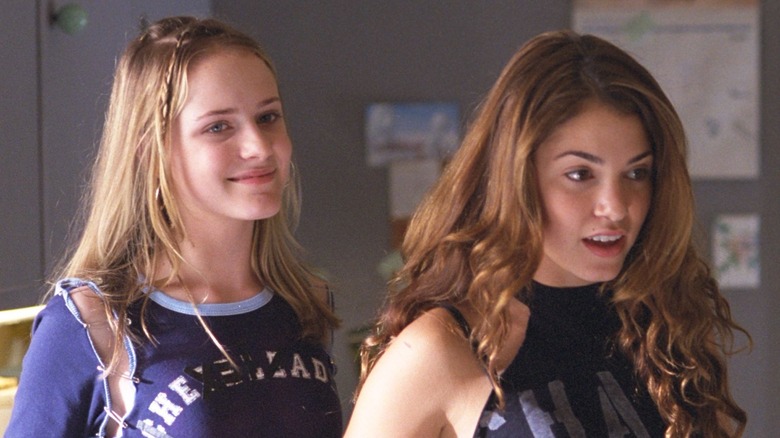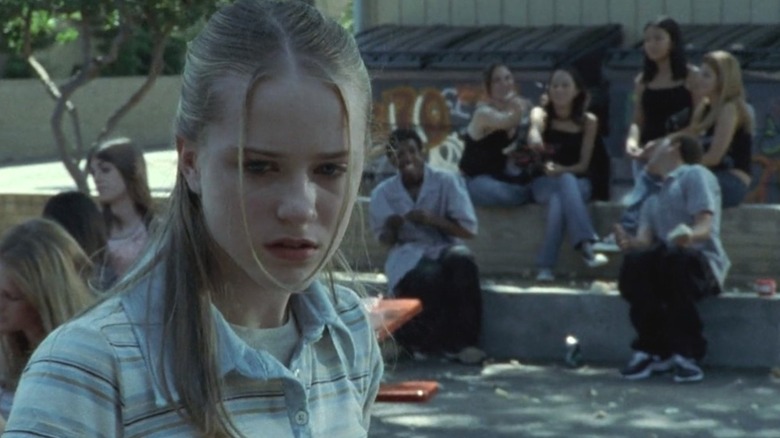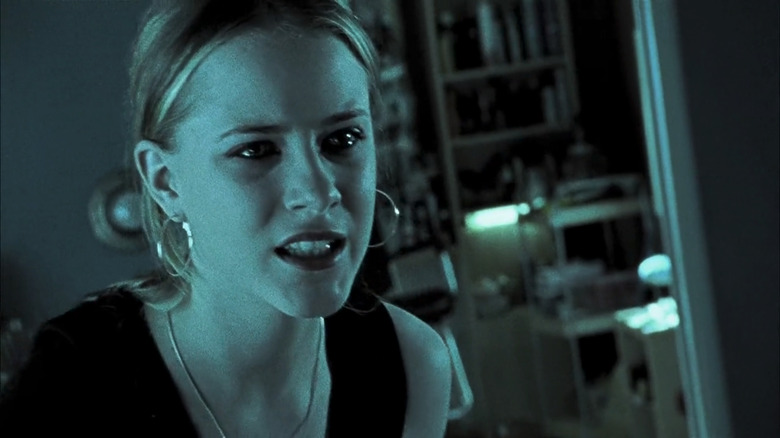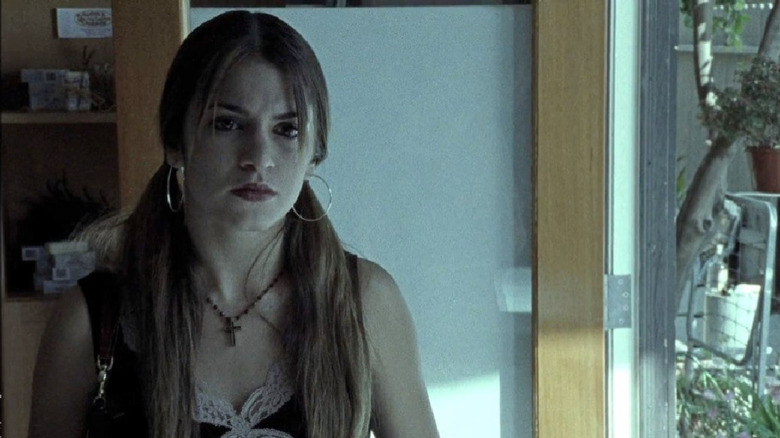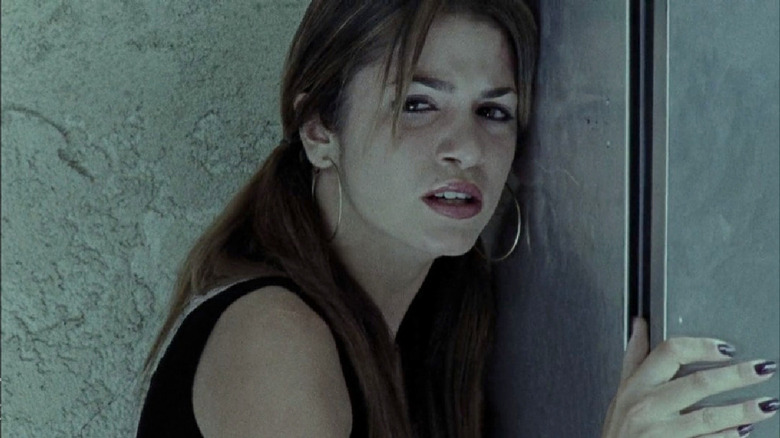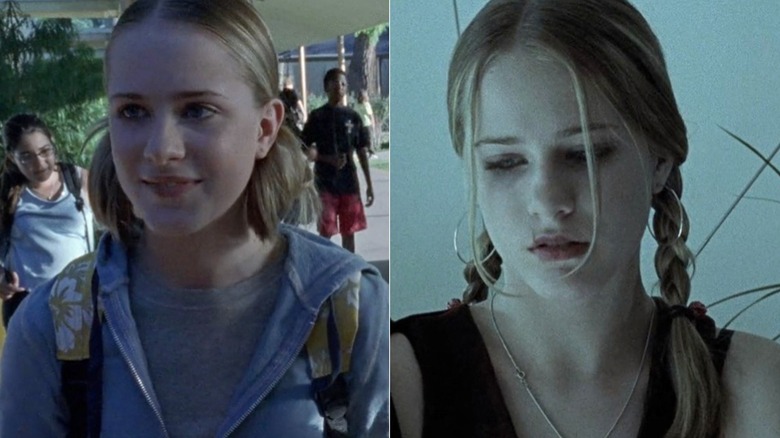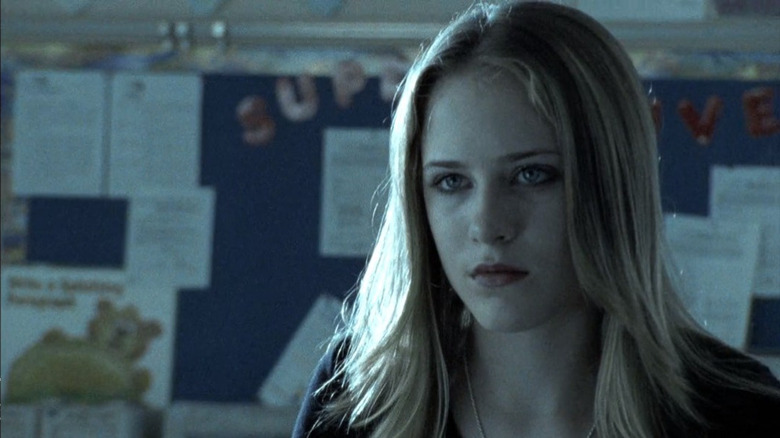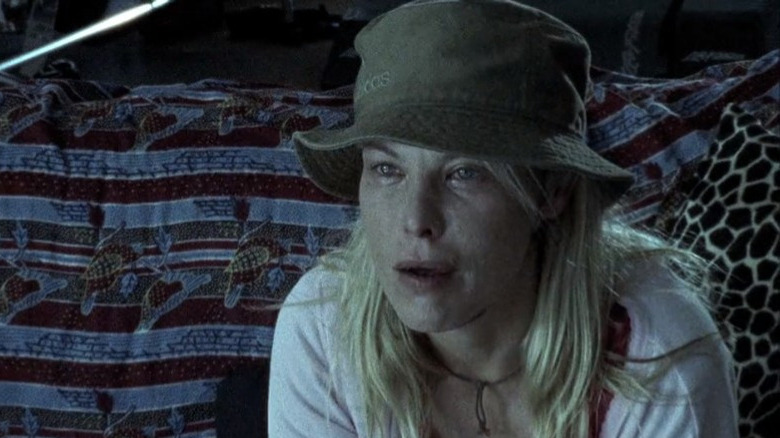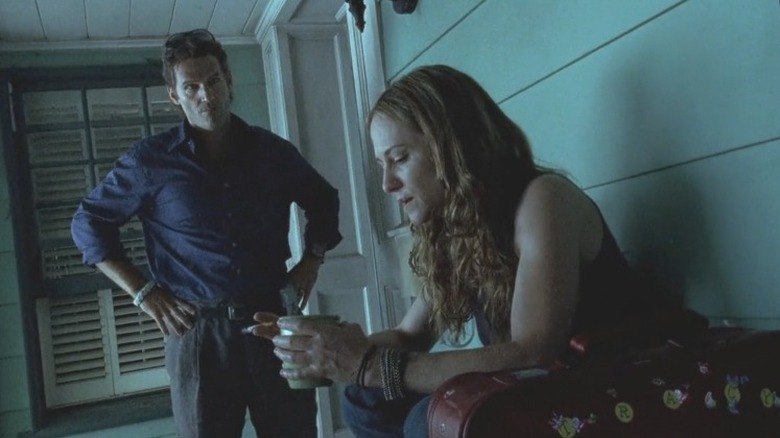The Ending Of Thirteen Explained
Coming-of-age stories have long been a popular movie genre. While many films of that nature tend to have happy, heartwarming endings, there are plenty that focus on the darker side of growing up, and what can happen if you take too many wrong turns. One of the more melancholy teen dramas of the last few decades is "Thirteen," which was "Twilight" director Catherine Hardwicke's directorial debut. The film starred Nikki Reed, who also co-wrote the script and based the narrative loosely on her own experiences.
"Thirteen" centers on Tracy Freeland (Evan Rachel Wood), a 13-year-old "good girl." She struggles with depression, which is generally unnoticed by her mother Melanie (Holly Hunter), who is dealing with overcoming her own demons. When Tracy meets and befriends the popular Evie Zamora (Reed), she's suddenly thrust into a world of petty crimes, drugs, and risky behavior. The film as a whole is mildly disturbing, as it depicts young teens in mature situations, but it ultimately serves as a warning that anyone can end up going down a dangerous path. The ending of "Thirteen" is also unlike what we see in typical coming-of-age movies, because it doesn't offer any answers.
What you need to remember about the plot of Thirteen
"Thirteen" follows Tracy Freeland, a teen girl starting 7th grade with her friends. However, the start of the year at a new school causes some personality changes in her, especially after she makes it her goal to become friends with the "it" girl, Evie Zamora.
After being made fun of for how she dresses, Tracy modifies her look to impress and attract the attention of Evie, which works. Her new friend exposes her to a different side of life, including drugs, shoplifting, and sex. Tracy abandons her old friend Noel (future "High School Musical" star Vanessa Hudgens), doesn't focus on her schoolwork, and spends all her time with Evie, who stays with Tracy and her family for an extended time. Tracy's brother Mason (Brady Corbet) grows more concerned for his sister and seems disgusted by her behavior.
Melanie worries about her daughter and is also concerned about Evie's home life, repeatedly trying to get in contact with the latter's legal guardian, Brooke (Deborah Kara Unger). She also tries to have Tracy's father, Travis (D. W. Moffett), house his daughter for the time being to remove her from her new friend's influence. He doesn't understand why Tracy's personality shift is an issue and is more focused on his new job. Tracy continues to act out, getting both a tongue and belly button piercing and becoming more antagonistic towards her mother.
We have to guess where Tracy will go next
The end of "Thirteen" is distressing, and doesn't offer any definitive closure for Tracy or her mother Melanie. After Melanie, Evie, and Brooke confront Tracy about the trouble the teens have been getting into, Brooke accuses Tracy of being the instigator. After Brooke threatens to move to a different city with Evie, they leave, and Tracy sobs on the floor while Melanie tries to comfort her. They fall asleep in Tracy's room, and the movie ends with a blurry dream shot of Tracy dejectedly riding a spinning carousel in a park before screaming.
The ending can mean many things: a symbol of Tracy's lost state of mind, the lack of control she has in her life, or her pent-up frustration. What it doesn't offer are answers. Will Tracy open up to Melanie about everything that happened the last few months? Will Tracy get the help she needs? What will become of Evie? We're left to guess what the future will hold, which in a way is yet another reminder of real life — you don't always know what's going to happen next. All we can hope is that things end up for the best for everyone involved.
What happens to Evie?
As the movie comes to a close, Evie and Brooke plan to move to Ojai, California. Brooke argues that the move is to help Evie and remove her from Tracy's influence. However, as the audience knows, it isn't Tracy that Brooke should be worried about. Because Evie is not forced to come to terms with her actions or her part in Tracy's behavior, it is likely that she will continue to engage in the same activities despite the move. Brooke isn't making her take accountability for anything, only shifting the blame onto someone else. Removing Evie from her environment won't change anything because Evie is the one causing the chaos.
There's also the matter of Brooke's oversight. There are clearly rules in place for Evie — for example, she's not supposed to be on Melrose Avenue without an adult. But Brooke seems to do little to make sure the teen is following them. Without enforcement, Evie will continue to do what she likes.
We don't know what happens to Evie after the move. We can speculate that she will continue her behavior for a time and hope she matures and grows out of her ways. Evie cuts Tracy out of her life during her last days in Los Angeles, so it's unlikely that, even if we continue to follow Tracy's story, we'd find out what happened to Evie.
Can we trust anything Evie said?
Evie reveals her true nature when she convinces Brooke that her drug use and other deviant behaviors are Tracy's fault. While there are hints throughout the movie — particularly when Tracy asks if Evie did anything with the guy that Tracy's interested in — seeing Evie pretend to be the victim of the situation solidifies her devious nature in the audience's mind.
Her willingness to lie to Brooke, and likely to Melanie, makes Evie's words unreliable. Though not the narrator or main character of "Thirteen," she influences Tracy's life in a significant way in a matter of months. Anything she's told Tracy, causing the teen to drastically change, could be a lie. She causes Tracy to become someone else, just to meet a goalpost that keeps moving for a person who ultimately is only playing a game for her own amusement. Evie has little control over her life, and lying about it may be the only way she has any control over her situation.
Even when Tracy thinks she's gained ground with Evie, she finds out that Evie has a fake number. The two only become "friends" because Tracy tracks her down and steals a wallet to impress her. There's a strong possibility that Evie told Tracy what she thought she wanted to hear to gain her trust and use her for the short term. When Tracy and her family no longer serve Evie, she lies and leaves.
The shifting colors of the film signify Tracy's personality shift
While Catherine Hardwicke is now well-known for the iconic blue filter of the first "Twilight" movie, her use of color to set a mood started with her directorial debut. At the start of "Thirteen," the colors of the film appear pretty standard, with vibrant hues as Tracy and Noel walk through a park. However, as the film continues, the movie appears more and more blue-toned, reaching an obvious point when Melanie, Tracy, and Evie go to Evie's house and see the results of Brooke's plastic surgery about 75 minutes into the film.
The shift from natural pigments to a more blue tone shows Tracy's downward spiral as she goes down a new path during her friendship with Evie. It turns her into a shell of who she was, adding a bit of melancholy to her life. The blue represents this struggle as the happy Tracy that audiences first meet turns into someone with dead eyes. She becomes more unhinged, acting out and being more aggressive with her mother, and the shift to blue shows not only Tracy's change but Melanie's reaction to it as she struggles to help her daughter.
When Tracy is on the merry-go-round in her dream at the end of "Thirteen," the colors of the movie shift back to what they were at the beginning, perhaps symbolizing Tracy's return, or the start of her return, to her previous self.
Tracy's poem foreshadows the end
At the beginning of the film, Tracy is trying to read her mother a poem she wrote. It seems innocent enough, but when you listen to the words, the deeper meaning of her poem becomes clear.
The poem discusses a man that is "crippled, but only his body was cracked." This could point to the changes Tracy makes to her body, like the piercings, but also the damage she puts it through because of the effects of drugs. A woman "closes the holy book of lies," which could imply that Evie is closing the door on her time in Los Angeles as she and Brooke prepare to move to Ojai. It could also imply that at the end of the movie, Tracy is closing the chapter of being friends with Evie, which involved lying to the people she loves.
The final line of the poem, "she covers her eyes, denying to herself what she thought happened," could hint at how Tracy feels at the end of "Thirteen." As she breaks down on the floor with Melanie, the teen may be in denial about what has happened and how she's changed her life at that point. She is in disbelief that she'll have to repeat the 7th grade, and maybe she can't believe someone she saw as a friend would turn on her so easily.
Who or what is the true villain of Thirteen?
The villain of "Thirteen" isn't a person — it's a thing. Tracy is eager to shed her youthful image, to grow up and be considered mature for her age, whereas Brooke is doing everything she can to cling to her youth. The concept of youth is the villain, ultimately causing many of the characters to make decisions that negatively impact their lives.
It works on the characters in different ways. Tracy wants to leave her youth behind, only realizing it's important to have at the end of the film. Brooke is willing to put herself in harm's way to hold onto it. Evie is only willing to use it when it gives her what she wants. Melanie needs it to handle her daughter's growing deviance and is complimented for it by Evie, but it's because of her own youth that she knows Tracy is in trouble.
All of the female characters are dealing with youth in one way or another, in a manner that could result in a bleak outcome. Brooke could be permanently scarred, Tracy could have a drug addiction, Evie could fall deeper into a lifestyle that's already causing her issues, and Melanie could lose her daughter. Everyone is fighting youth in some way, making it the true villain of "Thirteen."
Thirteen affected Nikki Reed's life
Since Nikki Reed used parts of her real-life as the film's inspiration, some assumed her life was much more troubling than it apparently was. In 2012, Reed confessed that she may have been a bit harsh with her depictions of her family, saying, "I have tons of regrets with that. 'Thirteen' was really hard on my family. I wrote this movie about them and their flaws and imperfections and what it was like growing up ... You get older and it's like, how dare I portray my father as being a totally vacant careless schmuck?" (via HuffPost).
Reed also used her mother as inspiration for Tracy's mother, Melanie — especially some elements of their rocky relationship. She expressed her regret to the New York Daily News, saying, "My mom can't defend herself to the world. She is such an amazing woman, with such an open heart. It's a real hard line, and I crossed it. I took everyone's life story and assumed it would be a great thing to put on screen. I was being selfish and I feel so horrible about it. I feel so guilty."
Thankfully, her parents were able to forgive her. "Now I have a great relationship with both my parents," Reed told HuffPost in a separate interview. "I guess that's part of when you sign up to be a parent — you also have a pot of forgiveness ready for your kid."
